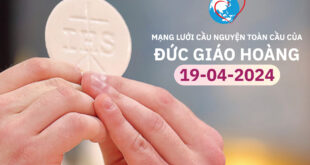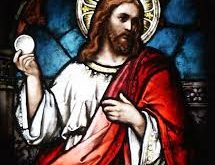
🍀🍀MẾN YÊU HẰNG NGÀY🍀🍀
⏰Thứ 2, 06-09-2021 ⏰
🌻(Lc 6,6-11)🌻
Một ngày sa-bát khác, Đức Giê-su cũng vào hội đường và giảng dạy. Ở đó có một người bị khô bại tay phải. Các kinh sư và những người Pha-ri-sêu rình xem Đức Giê-su có chữa người ấy trong ngày sa-bát không, để tìm được cớ tố cáo Người. Nhưng Người biết họ đang suy nghĩ như thế, nên bảo người bại tay: “Anh trỗi dậy, ra đứng giữa đây!” Người ấy liền trỗi dậy và đứng đó. Đức Giê-su nói với họ: “Tôi xin hỏi các ông: ngày sa-bát, được phép làm điều lành hay điều dữ, cứu mạng người hay huỷ diệt?” Người rảo mắt nhìn họ tất cả, rồi bảo người bại tay: “Anh giơ tay ra!” Anh ấy làm như vậy và tay anh liền trở lại bình thường. Nhưng họ thì giận điên lên, và bàn nhau xem có làm gì được Đức Giê-su không.
SUY NIỆM
Đức Giê-su tiến vào hội đường giống như thói quen thường lệ Ngài vẫn hay làm trong ngày sa-bát, và rồi Ngài bắt đầu giảng dạy. Ngay trước mặt Chúa Giê-su là một người đàn ông với cánh tay phải bị khô bại, đó là một dị tật bẩm sinh mà người này mắc phải. Trong Hội đường đó cũng có các kinh sư và người Pharisêu đang rình xem Đức Giê-su có chữa cho người đàn ông kia trong ngày sa-bát không, để lấy cớ buộc tội Người vi phạm lề luật.
Công việc y tế bị cấm trong ngày sa-bát bởi lẽ nó tiêu tốn nhiều thời gian. Chúa Giê-su chữa bệnh bằng một lời nói mà thôi, mà dù Ngài có nói, có một hành động để chữa bệnh thì lại bị cấm trong ngày sa-bát sao? Vả lại, người đàn ông kia đã chịu đựng cảnh bại liệt đã lâu và anh cũng không còn cảm giác đau nữa, vậy việc chữa lành này có thể đợi đến ngày hôm sau cũng được. Chính điều này gây ra nhiều vấn đề hơn cho cuộc tranh luận của Đức Giê-su.
Đương nhiên Chúa Giê-su ý thức rõ những chuyện đang xảy ra. Lập tức Ngài nói với người đàn ông khô bại tay rằng: “Anh đứng dậy và ra đứng giữa đây!” Hiệu lệnh “trỗi dậy” như là một sự biểu lộ về việc sẽ xảy ra kế đó; người đàn ông này sẽ được đón nhận một cuộc sống mới. Không hề có một sự giấu kín nào về những điều Chúa Giê-su làm mà lại không được chứng kiến bởi mọi người.
Thế nhưng trước hết Ngài đặt một câu hỏi dành cho toàn thể hội đường, bao gồm cả những kinh sư và người Pharisêu nữa: “ngày sa-bát, được phép làm điều lành hay điều dữ, cứu mạng người hay huỷ diệt ?”
Đó là một câu hỏi khó có thể trả lời được, bởi lẽ đã quá rõ ràng. Thế nhưng đây lại không phải là điều mà những người Pharisêu đang suy nghĩ, “có đúng chăng khi vâng theo Lề luật hay là phá vỡ chúng?” Đối với những người này, Lề Luật và những gì được viết trong đó mới thật là tối cao. Nhưng với Đức Giê-su, Lề luật gắn liền với sự thật và những điều tốt đẹp. Không có việc thi hành luật nào lại vi phạm sự thật và ích lợi cả. Nhưng có đôi khi để bước theo sự thật và những điều tốt lành thì phải đi ngược lại với những gì được viết trong Lề Luật. Có những điều hợp pháp nhưng không phải lúc nào cũng hợp đạo đức, vậy thì thật là một tội ác nếu vâng theo thứ lề luật này.
Một điểm quan trọng nữa từ đoạn trích Tin Mừng hôm nay, đó là tội lỗi phát xuất từ lòng đố kỵ sẽ dẫn chúng ta làm điều phi lý và dại dột. Nó khiến chúng ta trở nên đui mù, suy nghĩ dại dột và nói lời ngu xuẩn. Bạn có thấy sự đố kỵ hiện diện trong mối tương quan nào của mình không? Và liệu bạn có nhận thấy bản thân mình đang hành động và suy nghĩ một cách phi lý với những con người trong tương quan đó chăng?
Chúa ơi! Con ước muốn được thoát ra khỏi những tội lỗi của kiêu căng, thèm muốn và đố kỵ. Xin giúp con thấy được những điều này nơi chính cuộc sống của con, để con biết thống hối và thay thế chúng bằng chính tình yêu và lòng thương xót của Chúa. Lạy Chúa Giê-su con tín thác vào Ngài.
—//—-//—-
Biên dịch: Nhóm Bạn Đường Linh Thao
Nguồn:
https://livingspace.sacredspace.ie/o2232g/
Jesus had gone into the local synagogue, as was his practice on the sabbath, and began to teach. Right in front of him was a man with a withered hand, no doubt something he was born with.
There were scribes and Pharisees in the congregation and, we are told, they “were watching him” to see whether he would heal the man on a Sabbath day so that they could accuse him of breaking the Law.
Medical work was forbidden on the Sabbath because it normally took time. Jesus, of course, healed with just a word but even if he did not, could one say that healing was against the spirit of the Sabbath? At the same time, it is also worth noting that the man was suffering from a chronic and probably non-painful disability. There was no need for him to be cured on the spot; it could easily have waited until the next day.
That gives further point to Jesus’ argument. The poor man had clearly been “planted”. He was being used as bait for their sinister ends. For the Pharisees and their co-conspirators the man and his plight were secondary. They had to prove their point and he was seen as a useful tool.
Jesus, of course, is fully aware of what is going on. He speaks directly to the disabled man: “Rise up and stand out in the middle!” The command to “rise up” is already an indication of what is going to take place; the man is going to be given new life. Nor is there any secrecy. What Jesus is going to do is to be seen by all.
But first he puts a question to the whole congregation, scribes and Pharisees included: “Is it lawful on the sabbath day to do good, or to do evil? to save life or to destroy it?”
It is really an unanswerable question because the answer is so obvious. But it was not the way these Pharisees were thinking. Their question would be very different: “Is it right to obey the Law or to violate it?” For them the Law, even the letter of the Law, was paramount. There is an irony in Jesus’ question because Jesus is planning to bring healing into a man’s life while they were preparing to bring about his destruction. Who was really breaking the Sabbath?
Not so with Jesus. For him the Law was relative to the true and the good. No implementation of a law can offend the true and the good. And sometimes the following of the true and the good may have to go against the letter of the law. What is legal is not always moral. It can be immoral, that is, evil, to obey a law in certain circumstances. What is moral sometimes transcends the law and may even contradict the law.
Hearing no dissenting answer, Jesus says to the man, “Stretch out your hand.” He did so. His arm was fully restored to normal.
The scribes and Pharisees were furious and began to plot against Jesus. Their plans had been brought to nought. They showed no pleasure that a crippled man had been made whole. Their interpretation of the law had been shown to be wanting and they had to get back at Jesus.
Such situations are by no means unknown in our Christian life and in our Church. We will run into situations where doing good may be in conflict with traditional regulations and legal formulae.
We will find ourselves in situations where contemporary Pharisees will try to put the Church into a straitjacket of narrow-mindedness and fundamentalism whether it involves our understanding of the Scripture or the liturgy or morality or something else. These are people who put the letter of the laws, regulations and rubrics before love. For them it is more important to observe the externals of rules than to be a loving person.
One important point to learn from this passage is that the sin of envy lead us to irrationality and foolishness. This sin blinds us and leads us to think and say foolish things. This is what the scribes and Pharisees did. Who in their right mind would “accuse” Jesus of doing something as good as healing on the Sabbath? Only those who have become blind by envy.
Though this passage is disturbing, it should hopefully become disturbing in a helpful way. It should be an opportunity for each of us to look at our own lives and to examine the relationships we have. Do you see envy present in any of those relationships? Do you see yourself acting and thinking in an irrational way at times towards this person or that?
Reflect, today, upon any tendency you may have to be like the scribes and Pharisees. Know that their actions were included in the Scripture to teach us about this ugly sin we sometimes struggle with. Let the disturbing part of it motivate you to work toward freedom from envy in your life.
Lord, I do want to be free of the sins of pride, envy and jealousy. Help me to see these in my life, to repent of them and to replace them with Your mercy and love. Jesus, I trust in You.








